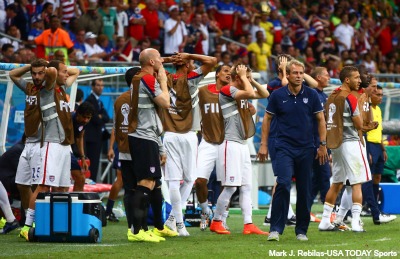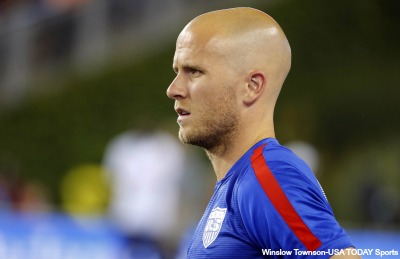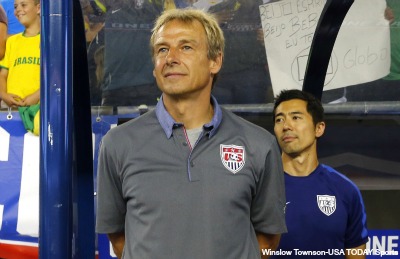Jurgen Klinsmann's tenure as the U.S. national team coach has always been a series of peaks and valleys. The highs have been great: Advancing from a perceived Group of Death into the knockout round of the 2014 World Cup, and later beating The Netherlands and Germany in back-to-back friendlies.
But the lows have been brutal: A 2-1 loss to Honduras in qualifying for the last World Cup, and a 2-1 loss to Jamaica in last summer's Gold Cup semifinal. The latter is widely regarded as the biggest upset in U.S. soccer history, and it has the men's national team trending down as a critical juncture approaches.
This weekend, the United States begins World Cup qualifying. With it comes a margin of error that has grown tremendously thin. Facing a schedule that projects to be a cakewalk, the U.S. squad can't afford to slip-up. In the first of two qualifying matches, the U.S. plays tiny St. Vincent on Friday, currently ranked 129th in the world. After that is a showdown with Trinidad and Tobago, a match that wouldn't be worrisome if the U.S. hadn't won just one game in its past six.
Confidence is low right now, and there's not much on the field to lift it up.
Make no mistake, this is a team under pressure.
Fifteen months ago, no one could have predicted this. Klinsmann brought his first U.S. squad to the World Cup -- amid controversy and criticism, just to show you he's used to these conditions -- and saw more success than many experts had projected. The Americans finished second in a group where they were seen as a very distant third, and they pushed an impressive Belgium squad to the brink in overtime.
Those results earned Klinsmann a lot of credit. His method of management wasn't always orthodox, and he had been surprisingly salty in leaving Landon Donovan off of what would have been his final World Cup roster. But in just three years at the helm, his strategy appeared to have the program pointed in the right direction.
The team's performances of late, though, are riddled with concern. Losses to Jamaica, Costa Rica and Mexico show the Americans are struggling to compete with their own continent, never mind the rest of the world.
Klinsmann has dismissed those results in favor of emphasizing the quality of on-field play.
"I agree with the fact that we didn't get the results that we wanted, but I don't agree with the fact that the performances were not the ones we wanted to see," said Klinsmann at a press conference on Thursday. "I think we had a very, very good game actually against Mexico. We discussed that at length after the game. But we came out on the short end. We lost it. That's the bottom line."

He's dead right on that point: Winning is the bottom line. And not just because progress must come in the form of success, but because it's how a manager's tenure should be measured four years into his reign. Facing a clear path to a Gold Cup championship, Klinsmann's crew veered sharply off course and finished fourth.
It's hard to take moral victories from that, and fans aren't interested in celebrating them, anyway. Given his sometimes cryptic leadership style, Klinsmann can sometimes face criticism just because outsiders don't understand what he's trying to accomplish. To some degree, it's fair to reserve judgment. But the coach can't also hide behind that persona as a shield when critics blast his team's poor play.
It's more than just Klinsmann's job that's at stake here, too. If this next run at a World Cup -- and our subsequent performance on that stage -- doesn't yield the measure of success we were promised in 2011, then we've squandered so much more than money and time. We've thrown away the final years of Donovan's international career, and much of the primes of Clint Dempsey, Tim Howard and Michael Bradley.

Those are some of the best players to ever don the U.S. national team kit, and they've proven their ability to compete with the world's best through their professional careers. For them to have failed to come together and lead the U.S. national team to greater heights is a huge lost opportunity.
Klinsmann continues to emphasize that the on-field play has been encouraging, regardless of the results. That's worked as an excuse, but it won't much longer. At some point, encouraging play has to translate into material progress. Klinsmann can't expect everyone to have faith in the positive strides that only he sees.
The next World Cup is nearly three years away. Between now and then, a lot can happen. For Klinsmann's sake, it better start happening now.
-- Follow Jonathan Crowl on Twitter @jonathancrowl.






